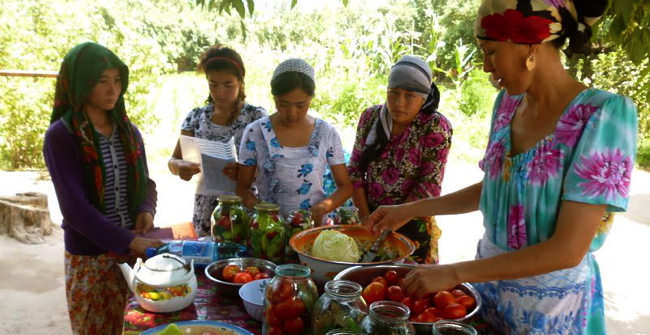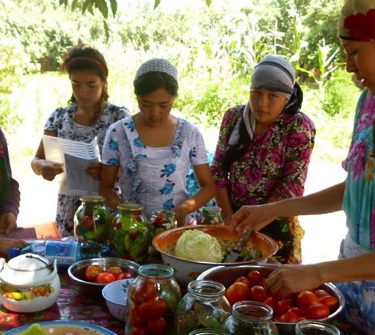Support for self-employment of women 2012
Support for self-employment of women 2012


The goal of the project is the creation of jobs and the development of women to be self-employed so that they can be independent from their husbands and in-laws. Women have to decide themselves what activities they want to be involved with.
Status: completed
Duration: May 1 – November 30, 2012
Development of women’s cooperatives in the Shahrtuz region in Southern Tajikistan
Objectives
- Professional integration of 105 women through establishment of seven groups of mutual aid
- Creation of sources of income for 105 single women through establishment of seven women’s cooperatives/micro businesses
Background and description of needs
Khatlon is a steppe and semi-desert province of Tajikistan, bordering Uzbekistan and Afghanistan. The vast majority of its residents live off agriculture (mainly cotton cultivation), and animal grazing. The Shahruz region is one of the poorest in the country – in 2010 the average monthly wage in the region was 153 TJS (US$ 30), falling well below the national average of 285 TJS (US$ 53) (source: www.stat.tj).
This situation is a result of the civil war that ravaged the southern part of the country during 1992-1997, which consequently led to the closure of factories and enterprises. Since then, the province has not created new jobs. Employment can mostly be found in the so-called grey market where the trade of commodities is done through distribution channels which are unofficial or unauthorized.
As a result of this very difficult economic situation, approximately 60% of men leave Tajikistan to look for work elsewhere. It is estimated that diaspora remittances from Russia account for approximately 30-40% of the country’s GDP.
Although it provides a significant boost to the country’s GDP, this situation is very unfavorable for separated families. Women are dependent on money transfers from abroad, which are often inadequate when taking into account the recent sharp increases in food and fuel prices in Tajikistan.
In many cases, women live with their husbands’ families which are commonly very large and intergenerational. In such a system, the husband does not send money to his wife, but rather to his parents or brothers, with whom his wife lives.
The husband’s family manages the funds, and the wife and her children are dependent on her in-laws. Often, men find new families abroad and stop sending money. In such cases, women and her children are forced to leave their in-laws’ residence.
As a result of the growing prevalence of such cases, there has been an exponential increase of suicides among women in recent years. During one week in 2006 in the city of Shahrtuz, four women committed suicide.
During one month in 2006 in the region of Shahrtuz, local authorities reported 10 such cases. Since that time, the Chashma organization – PCPM’s local partner in Tajikistan – has been focused on actions towards psychological support and entrepreneur development among girls and women.
Due to its warm climate and irrigation system, the Khatlon Province is conducive to the cultivation of fruits and vegetables, most of which used to be exported to Uzbekistan and Russia. The situation in the region worsened three years ago when Uzbekistan closed its borders due to the conflict with Tajikistan.
Currently, the Khatlon Province does not have foreign markets for their goods. As a result of the Tajik-Uzbek conflict, a trade agreement was concluded between Tajikistan and Afghanistan. The Foundation Aga Khan IV, which builds trade between the two countries, mainly in the Pamir Mountains, initiated the construction of a bazaar on the Tajik-Afghan border in Nizhny Panj.
The bazaar, located in the Special Economic Zone, is to be launched in late 2012. The Chashma organization prepares its projects’ participants to trade on the border bazaar.
The goal of the project is the creation of jobs and the development of women to be self-employed so that they can be independent from their husbands and in-laws. Women have to decide themselves what activities they want to be involved with. The project envisions teaching women how to be self-reliant and responsible.
Beneficiaries
Direct beneficiaries of the project are approximately 105 women and 315 family members of the project participants (assuming that one woman supports three family members, usually children)
Project location
The project will be implemented in the Khatlon province, in the Shahrtuz region, and in the Helmatova jamoat. The Khatlon province, and its integral part of the Shahrtuz area, are the most southerly parts of Tajikistan, bordering Uzbekistan to the west and Afghanistan to the south and east. The city of Shahrtuz lies approximately 30 kilometers from both borders, and about 230 km from Dushanbe.
The grant, amounting to PLN 120,000, received under the Polish Aid program of the Polish Ministry of Foreign Affairs in 2012.
